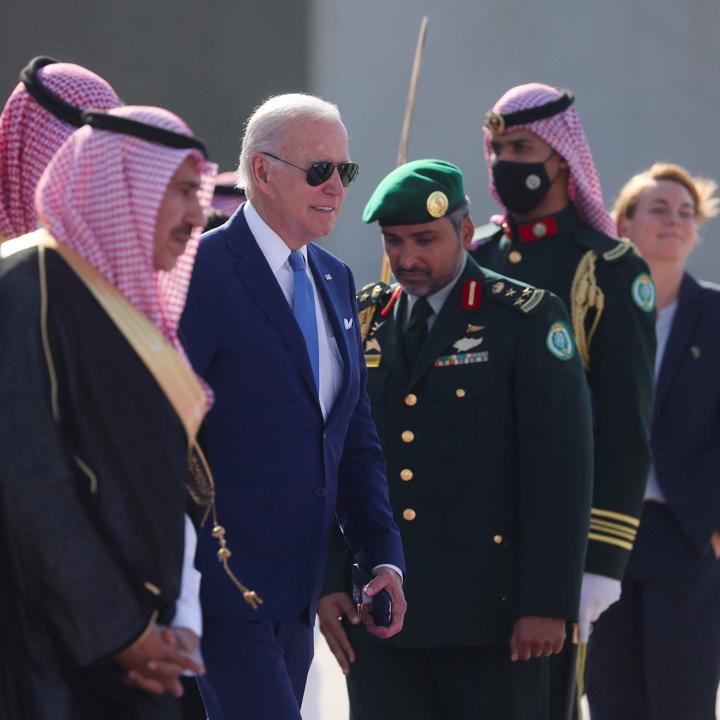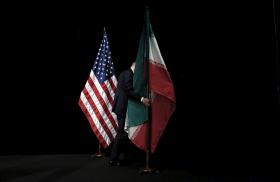
- Policy Analysis
- PolicyWatch 3788
Israel Normalization Negotiations and the U.S.-Saudi Defense Relationship

In discussing a potential deal with Israel, Riyadh is pressing Washington for expedited access to more advanced U.S. weaponry.
The contours of an emerging U.S.-brokered normalization agreement between Israel and Saudi Arabia are already in public view. Riyadh mainly seeks U.S. support for its civilian nuclear program, broader trade access (possibly including a free trade accord), still-undefined concessions on the Palestinian issue, and an array of U.S. defense commitments and upgrades, including some form of security guarantee and access to more advanced military equipment and streamlined procurement. Washington has plenty to offer here—as previous normalization agreements have shown—provided certain conditions are met.
Better Weapons, and Faster
The longstanding Saudi request for more advanced U.S. weaponry is straightforward: Riyadh is unlikely to accept anything less than what other Arab countries were pledged in return for normalizing relations with Israel. Yet its request for expedited access is more complicated: in addition to the perils of navigating the U.S. government’s byzantine arms exporting bureaucracy, almost every U.S. customer faces long wait times, production complications, and delivery delays. In the normalization discussions, Riyadh will try to use its leverage to make Washington honor its previous pledges to remedy this conundrum, and to gain access to the most-advanced U.S. systems.
The request for premium arms may reflect frustration in Riyadh at the contrast between sales in the Trump and Biden administrations. During Trump’s visit to Saudi Arabia in 2017, he announced billions in previous and potential future weapons contracts for the kingdom. While he was president, the United States approved Saudi purchases of the Terminal High-Altitude Area Defense (THAAD) system, helicopters, missiles for its Patriot air defense systems, air-to-ground munitions, antitank missiles, radar systems, and frigates. Many of these have yet to be delivered, and some have suffered production delays or supply-chain constraints.
In contrast, Saudi Arabia has been limited to primarily defensive systems during the Biden administration, such as missile interceptors for its Patriots. The notable exceptions are a 2021 approval to purchase 280 air-to-air missiles for $650 million (which the administration still framed as defensive because they would address airborne threats from Yemen) and a recent approval to purchase spare parts for existing armored vehicles.
Riyadh likely sees the normalization talks as a potentially useful conduit to resume purchases of more offensive platforms. Specifically, it will not want to receive anything short of what the United Arab Emirates was pledged in return for its normalization accord with Israel: the F-35 joint strike fighter, MQ-9 Reaper drones, and an assortment of precision-guided missiles. Together, these would have cost the UAE $23 billion and made it the first Arab country to operate both the F-35 and the MQ-9. However, the Trump administration failed to complete the sale before President Biden’s inauguration, and the deal broke down after the new administration—which initially approved it—reportedly discovered the construction of a clandestine Chinese military facility in the Abu Dhabi port complex. The facility, coupled with the UAE’s close ties to China in other sectors, particularly telecommunications, derailed the country’s bid to take possession of some of the most-advanced U.S. weapons systems. The Emirati example is on the minds of Saudi and U.S. officials alike: one Democratic senator acknowledged last year that Riyadh would likely seek the F-35 as well, but that certain safeguards regarding China would have to be in place first.
Indeed, Riyadh will face two major hurdles to accessing such advanced U.S. weaponry. The first is its relationship with China. Although these ties are perhaps not as extensive as the UAE’s, the kingdom maintains a close relationship with China in sensitive commercial sectors such as telecommunications, has purchased advanced weaponry from Beijing, and has also reportedly cooperated with China on drone and ballistic missile production. Recently, an agreement between a U.S. and Saudi defense firm was reportedly called off due to the latter’s relationship with sanctioned Chinese defense firms, and Saudi crown prince Muhammad bin Salman issued a thinly veiled warning that the kingdom could deepen arms purchases from China. For its part, Beijing is eager to expand its arms exports in the lucrative Gulf markets, and its defense ties with the Saudis could indeed increase rapidly if Riyadh so desires.
The second hurdle is the U.S. requirement to maintain Israel’s qualitative military edge (QME) in any sale to the region. Previously, Israeli agreements with Egypt and Jordan led to advanced U.S. arms sales to each country, albeit with subsequent restrictions on armament capabilities. The focal point here is likely to be the F-35 and associated variants and capabilities, given the fighter’s status and the fact that no country in the region besides Israel operates it. Since Israel desires a normalization agreement with Saudi Arabia, one can reasonably assume that it will temper its QME concerns slightly, though the details of the accompanying sales will still have to be ironed out pursuant to U.S. regulations.
Finding a streamlined weapons delivery mechanism, however, poses significant challenges. The Saudis are in the same spot as just about every U.S. defense customer: the Ukraine war has revealed the many issues plaguing defense industrial bases around the world, including America’s. While production is ramping up in some sectors, in others it is still lagging. The Saudis are no strangers to this predicament: while one of the platforms they have reportedly requested in exchange for normalization is the THAAD, they in fact already purchased the THAAD in 2018 and are simply waiting for delivery (which some sources indicate could take place around 2026). All U.S. customers are experiencing delays in acquiring weaponry, and even the closest partners feel the effects of the slow delivery process, including Israel, which is awaiting KC-46 refuelers, and Taiwan, which has a nearly $19 billion backlog. Absent significant domestic investments in upgrading the U.S. defense industrial base and reforms to the Foreign Military Sales process, all customers will continue to experience long delivery times.
Navigating this process is easier with legislative support, since Congress can hold up or complicate certain funding for arms sales and enact measures for oversight on weapons use. Although Congress has never successfully blocked an arms sale outright, it has come close, and Saudi Arabia was the target.
In 2019, the Trump administration invoked an emergency procedure to proceed with an $8 billion arms sale to Saudi Arabia and the UAE without congressional notification. When a bipartisan Senate vote advanced a resolution blocking the sale, Trump vetoed it and pushed the sale forward.
At other times, members of Congress have delayed or complicated arms sales. In the Middle East, Turkey’s desire to expand and upgrade its F-16 fleet—often viewed as part of an arrangement to garner Ankara’s support for Sweden’s NATO accession—has been subjected to holds in the Senate. Hence, if the Biden administration pledges to streamline weapons sales to Saudi Arabia, it would require coordination with defense firms as well as a concerted effort by the White House and Riyadh to improve the kingdom’s image on Capitol Hill and demonstrate why such sales remain in America’s national interest.
This is an area where the United States has some leverage in the normalization negotiations. One of the components of Saudi Arabia’s “Vision 2030” plan is to build an independent defense industrial base. Like many countries that rely on foreign arms suppliers, the kingdom has long chafed at the turbulence and delays associated with purchasing largely from a single supplier, in this case, the United States. Developing a defense industrial base is a way to attain greater independence, boost economic growth, and potentially create another tool for wielding influence abroad through arms exports. Vision 2030 includes plans to increase spending on domestic military equipment from 2 percent to 50 percent of overall spending, with the state-owned Saudi Arabian Military Industries (SAMI) and General Authority for Military Industries (GAMI) tasked with overseeing that effort. Riyadh has also announced that starting in 2024, foreign defense firms and other companies will be required to have regional headquarters in the kingdom.
Theoretically, an enthusiastic U.S. administration and supportive Congress could prove a boon to the kingdom’s defense modernization efforts. Efforts like the Red Sands facility, where the two countries jointly test counter-drone technology, can boost Saudi defense expertise. Another option would be granting Saudi Arabia the status of a major non-NATO ally (MNNA). While this designation is neither a treaty nor a defense commitment, a country so designated significantly upgrades its defense relationship with the United States. MNNA countries are eligible for priority access to U.S. excess defense articles (EDA), can host U.S. war reserve stockpiles, and are able to conduct “cooperative research and development projects on defense equipment and munitions” with U.S. firms. Other countries in the region designated as MNNAs include Egypt, Bahrain, Israel, Jordan, Kuwait, Morocco, Qatar, and Tunisia. This step could elevate the U.S.-Saudi defense relationship and provide additional resources for the kingdom’s efforts to establish its own defense industrial base.
Conclusion
Rightly or not, countries that purchase primarily from the United States tend to view the types of platforms they are offered as a barometer of their overall defense relationship with Washington. Washington’s defense partnership with Saudi Arabia has become one of its most polarizing defense relationships, and the resultant turbulence has fueled Riyadh’s desire to look elsewhere. A U.S.-brokered normalization agreement with Israel would provide an avenue for course-correcting this relationship in a time of great power competition, while ensuring that Washington remains Riyadh’s security partner of choice for years to come.
Grant Rumley is the Goldberger Fellow in The Washington Institute’s Diane and Guilford Glazer Foundation Program on Great Power Competition and the Middle East. From 2018 to 2021, he served as an advisor for Middle East policy in the Office of the Secretary of Defense.



